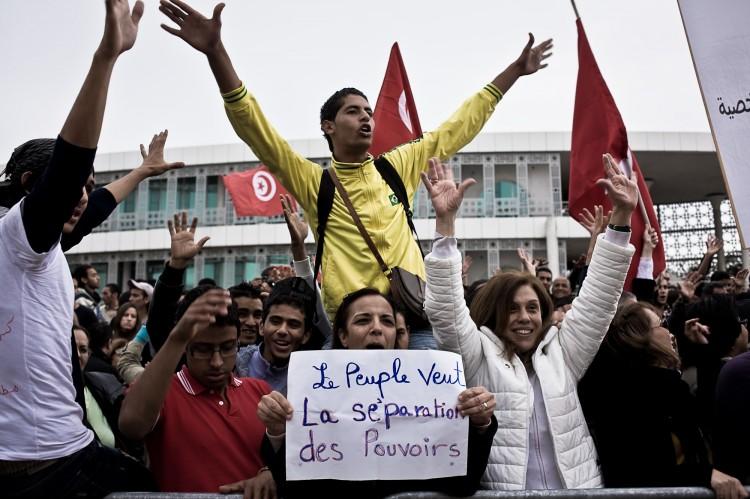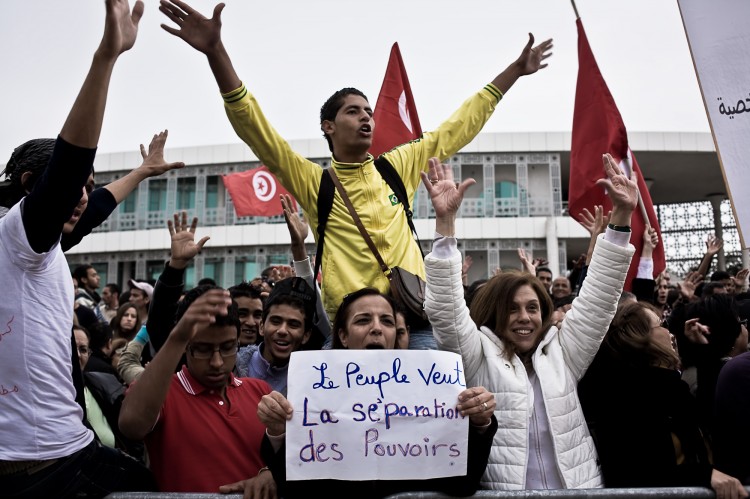LE BARDO, Tunisia—This time last year, the first winds of change were blowing across the Arab world—starting in Tunisia. A year later, although democracy is still a work in progress here, it’s clear Tunisians are enjoying, and carefully guarding, their breath of fresh air.
In the old Tunisia, under dictator Zine El Abidine Ben Ali who ruled for 23 years—ending Jan. 14, 2011—talk of politics was strictly prohibited. Now talk of politics is everywhere in the air across the country.
In the city of Sidi Bou, once a popular tourist destination before the revolution, sounds of classical Andalusian music can be heard as Tunisians drink coffee while overlooking the sunset illuminating the Mediterranean. Musician, Djamel Mlayah, said, “The fact that we can meet on the street to discuss, that is freedom and that is also being reflected in the music.”
Televisions and radios are turned on in shops and cafes, and Tunisians follow the daily news of the birth of a democracy. Since the revolution, 200 new newspaper titles have appeared. The message of the people is clear, and repeated in interviews and on protesters’ signs: “The people want a true democracy, otherwise leave now” they tell the post-Ben Ali government.
Further south, in the city of Tozeur, Labidi Jaffle Mohamed Ali, 36, talks about the changes he sees in how people treat each other. “Now there is respect for others, people are more open. Before it was impossible to discuss politics or religion—you didn’t know if a supporter of Ben Ali would be hiding in those listening.”
Under Ben Ali, the people were reduced to total political impotence, writes Paris-based psychoanalyst Fethi Benslama in his book, “Suddenly, Revolution!” He describes the “transformation of public actors into puppets, the brutal and technically sophisticated police organization, looting of the common goods by his voracious clan with the knowledge of all, and physical and moral humiliation of opponents.”
According to Benslama this is why the Tunisian’s desire for open and respectful policies is now on everyone’s lips.
Mlouka Rached, a fabric seller in Tunisia’s capital Tunis, said that he personally tasted the dictatorship of Ben Ali. He was jailed for one year because he had sympathized with the then-banned Al-Nahda party in 1991. Now, at age 40, he says he is optimistic about the provisional government headed by the Islamist Al-Nahda party. He actively follows the political news on the radio.
“The government has no prejudice, it wants equality. This is freedom. Look, from the street we see the mosque on the right and the bar on the left, everyone is free to choose,” said Rached.
Rached’s optimism is not shared by everyone. Ouerghi Amira and her friends, Samia Ben Mna Briki and Rana Ben Maa are more wary that Al-Nahda will take over the new government. “We are waiting to see if the new democracy will do, otherwise we will not hesitate to intervene again to get a true democracy.”
There have been frequent protests outside the palace of Le Bardo where the constitution is being drafted by an assembly dominated by the Islamist party Al-Nahda.
“We ask that the constitution be written in a maximum of one year. We also want the separation of powers,” said Dora Bel Hadjkhelifa, a civil servant, who took a day off to join the protest.
Yasmine, a business school student, accompanied by his university friends, remains day and night before the Palace of Le Bardo until the future of Tunisia is clearer.
“The provisional government should be used to draft the constitution and not to take power. The Department of Justice should be cleaned up. We’re here to let our message be heard, since we are in a democracy,” he said.
Souvenir seller at the Bardo Museum, near the sit-in, Kachrami Nasser, 54 thinks differently. He speaks of Al-Nahda as a party that is certainly religious, but modern and democratic. “You feel free to discuss, the fear is gone. We exchange ideas with tourists. Although they are rarer, I hope to find them en masse when they understand that there is nothing to fear,” said Nasser.
In Kairouan, Ghozzi Taieb, the new imam, has been in place since the revolution in the most prestigious mosque in Tunisia. “We do not use the mosque to talk politics, but indirectly, we are referring to Al-Nahda for the next election.” Al-Nahda is for the imam a party that supports the religious values of Islam without getting lost in extremism.
The path to an Islamisized democracy in Tunisia remains full of uncertainties. Tunisia is in an uncharted situation after the “dark years of confinement,” according to psychoanalyst Benslama.
This article was written following a press trip paid for by the Tourist Office of Tunisia.



